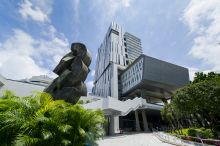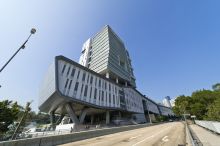The Master of Science in Chemistry programme aims to train and produce graduates with highly marketable research skills and experiences in a wide variety of advanced chemistry disciplines, such as catalysis; synthetic chemistry; materials & biomaterials chemistry; analytical & bio-analytical science; computational chemistry; environmental chemistry and chemical biology, to meet local, regional and global demands for R&D specialists in the industrial, commercial, and government sectors. Graduates are also eligible for pursuing higher research degrees in local and overseas universities and research institutes.
Year of Entry
2025Application Deadline
Local & Non-local : 31 May 2025Mode of Study
Combined †Mode of Funding
Non-government-fundedIndicative Intake Target
45Minimum No. of Credits Required
30Class Schedule
Weekday evenings and/or SaturdaysNormal Study Period
Full-time: 1 year;Part-time/Combined mode: 2 years
Maximum Study Period
Full-time: 2.5 years;Part-time/Combined mode: 5 years
Mode of Processing
Applications are processed on a rolling basis. Review of applications will start before the deadline and continue until all places are filled. Early applications are therefore strongly encouraged.Programme Outlines
Applicants must satisfy the University's General Entrance Requirements and the following programme entrance requirements:
- a degree in a relevant science discipline such as Chemistry, Materials Science, Molecular Biology or equivalent;
OR - evidence of academic and professional attainments acceptable for this purpose by the University and the Department.
Note:
Preference will be given to applicants who are currently working in areas related to testing and certification services.
Applicants whose entrance qualification is obtained from an institution where the medium of instruction is NOT English should also fulfill the following minimum English proficiency requirement:
- a score of 79 (Internet-based test) in the Test of English as a Foreign Language (TOEFL)@#; or
- an overall band score of 6.5 in International English Language Testing System (IELTS)@; or
- a score of 450 in the Chinese mainland’s College English Test Band 6 (CET-6); or
- other equivalent qualifications.
@ TOEFL and IELTS scores are considered valid for two years. Applicants are required to provide their English test results obtained within the two years preceding the start of the University's application period.
# Applicants are required to arrange with the Educational Testing Service (ETS) to send their TOEFL results directly to the University. The TOEFL institution code for CityUHK is 3401.
New Electives from 2024/25
CHEM6114 Food Processing and Food Chemistry (3 credit units)
CHEM6123 Postgraduate Symposium (1 credit unit)
CHEM6127 Dissertation (14 credit units)
CHEM6128 Environmental Health & Risk Assessment (3 credit units)
CHEM6129 Advanced Directed Studies (6 credit units)
CHEM6130 Cosmetic Product Development and Formulation (3 credit units)
CHEM6131 Frontiers in Modern Synthetic Chemistry (3 credit units)
CHEM6132 Frontiers in Sustainable Energy Conversion and Storage (3 credit units)
CHEM6133 Advanced Entrepreneurship Programme in Chemistry (3 credit units)
1. Core Courses (15 credit units)
|
Course Code |
Course Title |
Level |
Credit Units |
|
CHEM6118 |
Advanced Chemical Instrumentation |
P6 |
3 |
|
CHEM6119 |
Frontiers in Chemical Biology |
P6 |
3 |
|
CHEM6121 |
Academic and Industrial Research, Development and Innovation |
P6 |
3 |
|
CHEM6125 |
Selected Topics in Chemistry & Molecular Sciences |
P6 |
3 |
|
CHEM6126 |
Advanced Seminar Series |
P6 |
3 |
2. New Elective Courses (15 credit units)
Group A (at least 6 credit units)
|
Course Code |
Course Title |
Level |
Credit Units |
|
CHEM6127 |
Dissertation |
P6 |
14 |
|
CHEM6129 |
Advanced Directed Studies |
P6 |
6 |
Group B
|
Course Code |
Course Title |
Level |
Credit Units |
|
CHEM6114 |
Food Processing and Food Chemistry |
P6 |
3 |
|
CHEM6123 |
Postgraduate Symposium |
P6 |
1 |
|
CHEM6128 |
Environmental Health & Risk Assessment |
P6 |
3 |
|
CHEM6130 |
P6 |
3 |
|
|
CHEM6131 |
Frontiers in Modern Synthetic Chemistry |
P6 |
3 |
|
CHEM6132 |
Frontiers in Sustainable Energy Conversion and Storage |
P6 |
3 |
|
CHEM6133 |
Advanced Entrepreneurship Programme in Chemistry |
P6 |
3 |
Programme Structure
- Students may obtain the MSc degree by completing (30 credit units):
- 5 Core courses (15 credits units) provide training for the essential graduate-level chemistry, communication and research skills:
- The course learning outcomes of "Academic and Industrial Research, Development and Innovation" focus on research project design and management, which cover various topics including ethics in scientific research; research and uncertainty; hypothesis development; experiments design; data analysis; evaluation of research work; project management and communication skills.
- The courses "Advanced Chemical Instrumentation", "Frontiers in Chemical Biology" and "Selected Topics in Chemistry & Molecular Sciences" are designed for enhancing students' understanding on graduate-level chemistry and its applications in different areas including research and development, analytical chemistry, biological, medical and materials applications.
- The course "Advanced Seminar Series" enables students to develop skills in communication and presentation of scientific results in a professional manner as well as evaluate and apply research methodologies in their chosen specialized areas.
- The course learning outcomes of "Academic and Industrial Research, Development and Innovation" focus on research project design and management, which cover various topics including ethics in scientific research; research and uncertainty; hypothesis development; experiments design; data analysis; evaluation of research work; project management and communication skills.
- Elective courses (15 credit units) provide essential graduate-level training in various subject matters in modern chemistry.
Dissertation Arrangement
- Dissertation (14 credit units) is offered to provide opportunities for students to strengthen and apply their knowledge for tackling research challenges in chosen areas such as catalysis, synthetic chemistry, materials & biomaterials chemistry, analytical & bio-analytical science, computational chemistry, environmental chemistry, chemical biology, etc.
- The MSc Dissertation is an individual project that requires students to work on research projects for a period of two semesters (four semesters for students taking part-time mode of study).
Each student is required to produce a Project Report on his/her research findings and take part in oral defense of his/her research work.
- To facilitate the formulation of the dissertation research project in the first few weeks after joining the programme, research interests and project titles offered by potential supervisors and the email contacts of potential supervisors will be sent to the applicants that have accepted the admission offer in March/April so that they can contact with potential supervisors to formulate or initiate the research projects before the start of the programme.
- To ensure students satisfactorily fulfill their dissertation requirements, they will be required to deliver progress presentations of their research projects for evaluation by their supervisors and assessors after six weeks (for full-time students) or ten weeks (for part-time students) of the commencement of their dissertations.
Therefore, any necessary change or modification to their project objectives can be made at the early stage. Students will obtain excellent support from their supervisors and the corresponding research groups in case they encounter difficulties in their research projects.
- If the students are unable to complete the dissertation within the nominal period of the course, students can apply for an extension of the deadline for dissertation report submission. However, such application would require approval of the supervisor and the course leader.
- The MSc Dissertation is an individual project that requires students to work on research projects for a period of two semesters (four semesters for students taking part-time mode of study).
- Broad-spectrum R&D training in Chemistry and Molecular Sciences;
- Heavy research component, which aims to enable students to produce potentially publishable research results;
- Opportunity to participating in highly competitive research works;
- Participation in postgraduate research symposium.






